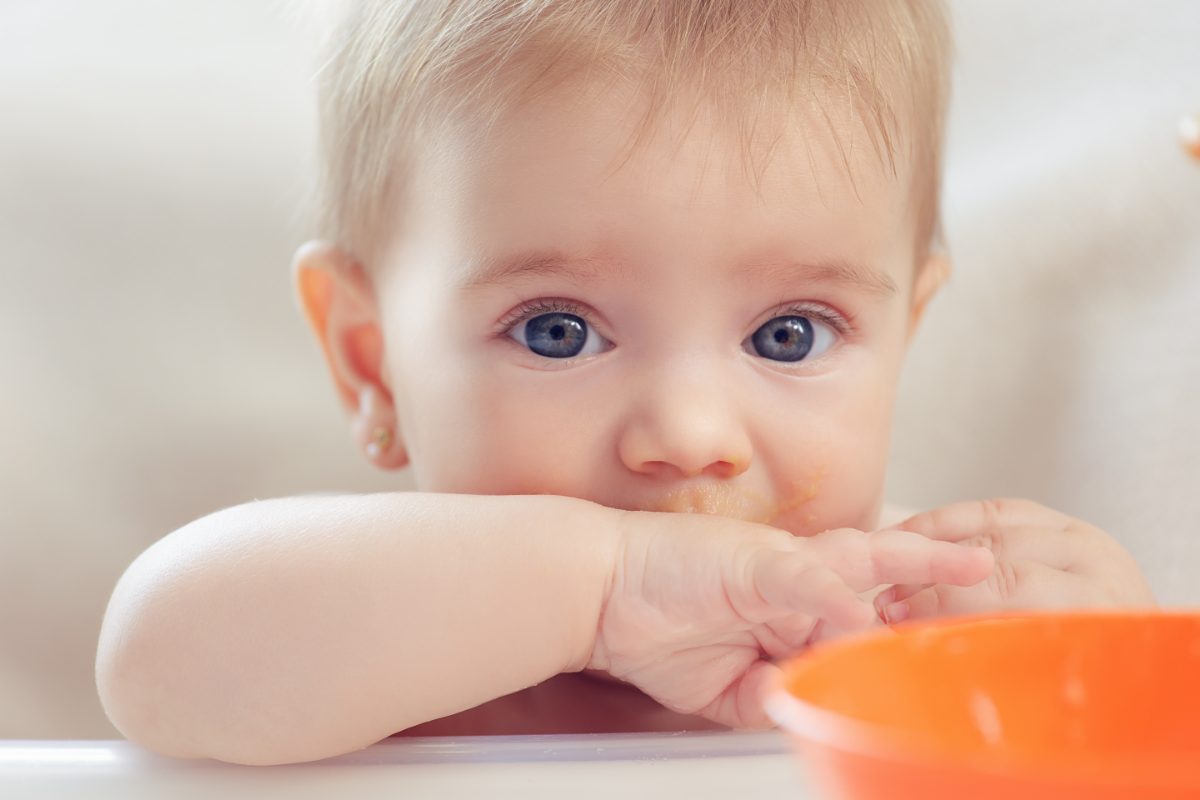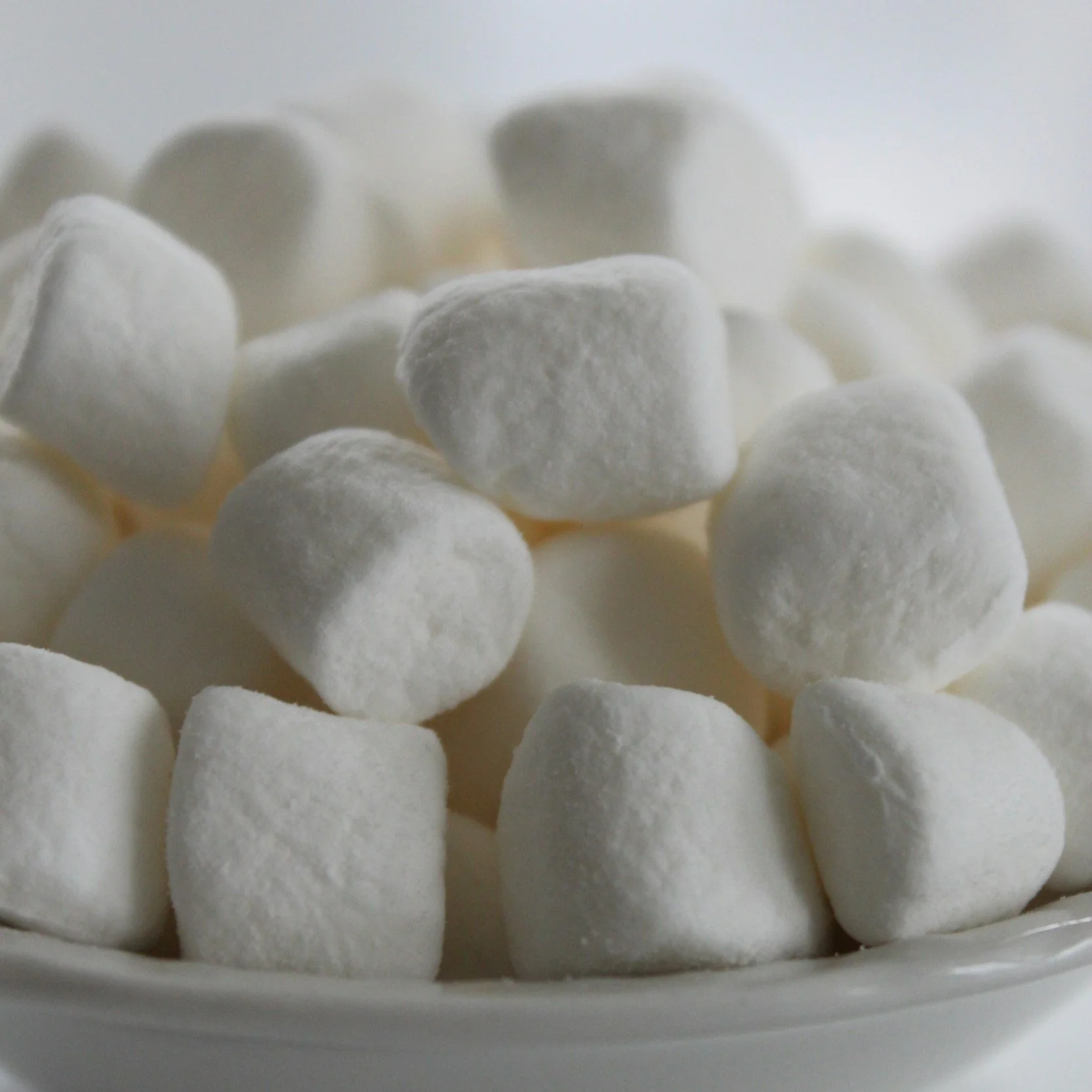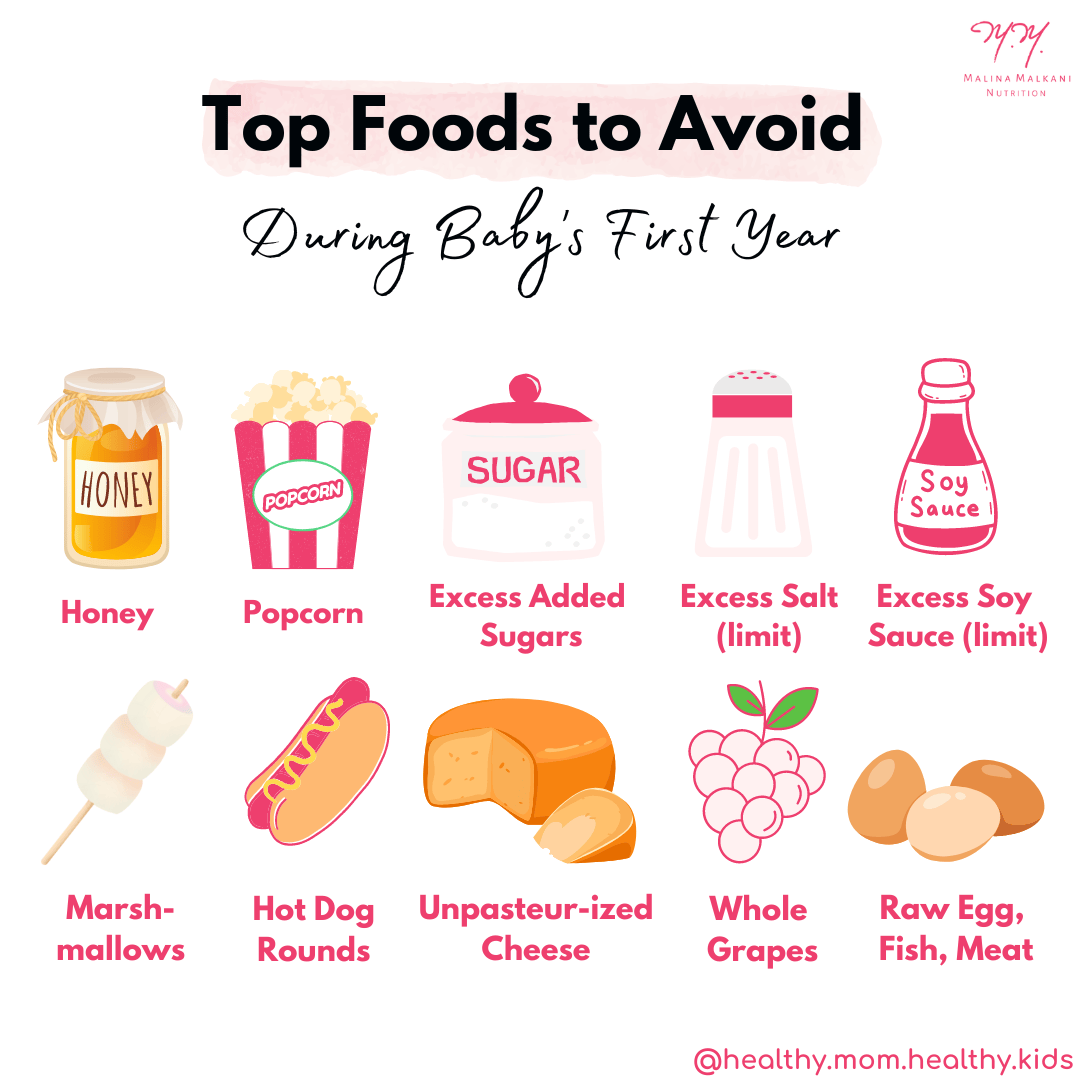10 Foods to Avoid During a Baby’s First Year
Are there foods babies should not eat?
It’s an exciting time in life when a baby begins showing the developmental signs of readiness for solids.
If your baby is ready to eat real solid foods, you may find yourself overwhelmed at the thought of figuring out which foods are safe for babies to eat and which foods to avoid and/or limit. The truth is, babies can eat a greater variety of foods than most people would think!
In general, there aren't too many hard & fast rules about what they should and shouldn't have, but there are some foods that increase choking risk and some that aren't safe for infants and should be avoided during the first year of life (or longer, in some cases).
Here are 10 of the most important foods to avoid and/or limit in your baby’s diet before the age of one:
Top Unsuitable Foods to Never Feed a Baby
Honey
Honey is a great natural sweetener, however, it should be avoided during a baby’s first year of life. This includes foods made with honey, even if they are cooked and/or baked. Although the risk is low, honey can be tainted with a bacteria called "Clostridium botulinum," which produces toxins that can cause botulism (a rare but serious disease that can lead to abnormal nerve functioning, weakness and paralysis). As a baby's digestive system matures, it can better handle the bacteria before it causes any harm. After age 1, honey no longer poses a risk, so it’s best to wait.
2. Popcorn
Popcorn can be dangerously inhaled into the lungs.
Aspirated popcorn can lead to infection and pneumonia.
Popcorn is not able to be modified for safer serving.
Molars are needed to break down kernels and fibers.
Popcorn is difficult for babies and toddlers to chew.
Not only should popcorn be avoided during the first year of life, but it should actually be avoided until little ones are around age 4. This is because children need to be able to chew the kernels and fibers of popcorn well, which usually doesn’t happen until they have all of their molars, giving them a robust ability to chew.
The best defense against choking in little ones is to be well educated in infant and child first aid and CPR, and to avoid foods that are known choking hazards.
3. Added Sugars
For babies under 2 years old, it’s best not to offer foods with added sugars, because added sugars tend to be higher in calories, but lower in health-promoting nutrients.
As a result and because baby and toddler tummies are small, foods with added sugars can end up replacing some of the more nutrient-rich foods that would benefit them more in terms of of growth and development. We want to maximize the nutrition in every bite as much as we can, given the size of baby and toddler appetites.
Also, babies are born liking sweet foods, so we already know that they will eat them! During the first year of life, babies are less picky and more willing to try different tastes and flavors (salty, sour, bitter, etc.). Taking advantage of introducing new and different foods during this time is key to your baby having a well-rounded and developed palate as they grow into toddlerhood.
4. Excess Salt
A little salt in a baby’s food is no biggie! But overdoing it on high-sodium foods during infancy is not recommended. The research we have on sodium during infancy suggests that the primary risk in offering salty foods during this first year of life is that we may prime a baby’s palate to prefer foods that taste salty. This makes sense, given that these early exposures to flavors and textures are setting the stage for food preferences.
Over time, an early preference for salty foods may increase the desire for higher amounts of sodium, and this is a known risk factor for high blood pressure and cardiovascular disease (CVD).
5. Soy Sauce
Soy sauce contains very high levels of sodium. If you plan on including baby in a meal that calls for soy sauce, consider using coconut aminos instead. While coconut aminos still contain sodium, but only about a third of the amount found in soy sauce.
Here’s a blog with more information about sodium and salt for babies.
6. Hot Dogs
Hot dogs are one of the top food causes of choking episodes in young children because of their size, shape, and texture. For this reason, the AAP recommends not offering hot dogs to children younger than 4 years of age. Even after age 4, it’s helpful to monitor closely if offering hot dogs (or any other rounded, coin-shaped foods) and consider cutting them into quarters before serving.
7. Marshmallows
While light and airy, marshmallows can be easily and accidentally sucked down the airway. They are also very sticky and can melt quickly, blocking the wind pipe. Further, marshmallows are made primarily with added sugars and are best avoided as much as possible during infancy and toddlerhood.
8. Unpasteurized Cheese
Unpasteurized cheeses and other dairy products can contain certain bacterias that can cause illnesses in babies and young children that may be life-threatening. A good rule of thumb to follow? If you were advised to avoid certain foods during pregnancy, it’s probably best to avoid feeding them to your baby before the age of one as well - including unpasteurized dairy.
9. Pickles
Pickles are best avoided until at least age 1 (some pediatricians recommend waiting until age 2) due to their very high salt content. See above for more information on sodium during infancy.
10. Whole Grapes & Whole Cherry Tomatoes
While very nutritious, the round, hard, small shape of grapes and cherry and/or grape tomatoes means that these foods are a choking hazard and need to be modified before offering to babies. When serving, be sure to cut lengthwise into fourths (or even eighths depending on the size) as these are one of the top foods that increase choking risk for our youngest eaters.
When it comes to feeding babies and ensuring that they are getting key nutrients that are safe for them to eat, easy to digest, and unlikely to cause a choking episode, it’s normal to feel overwhelmed! But it doesn’t have to be that way. There are many resources out there to help you, including myself.
This blog discusses many foods that pose a choking risk to babies. It’s important to note that choking episodes are rare. But it’s important for anyone feeding an infant to be trained in infant CPR and first aid just in case. Get trained by a nationally certified Red Cross and Lifesaving Society First Aid Instructor using this EXCELLENT, 2-hour, self-paced online course from Safe Beginnings - for 20% off, use my code: MALINA.
If the thought of starting solids feels overwhelming and you want someone you trust to do all of the thinking and meal planning for you, check out my Safe and Simple 12-Week Meal Plan! This complete roadmap walks you through the first 90 days of your baby’s solid food-feeding journey. It explains exactly how to introduce each food (with photos), provides multiple daily options for balanced baby meals, lays out the timing of top allergen introduction, provides over 30 family and baby-friendly recipes complete with weekly shopping lists, and provides a plan for keeping top allergens (once introduced) in your baby’s diet early and often.


















